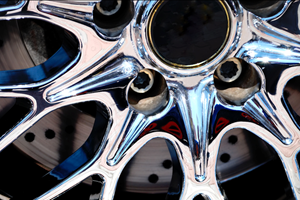When Sherrill Stoenner left his job in the finishing world recently to start his own consulting business, he knew a little about being a survivor. A farm boy at heart, he worked his way up in the finishing world through hard work and determination. He persevered through company management changes, buy-outs and mergers to become a respected individual in the industry, and is currently president of the Chemical Coaters Association International, a technical and professional organization that provides information and training on surface coating technologies. Sherrill is also winning his battle with prostate cancer, and feels good enough to tend to his farm in Kansas City. We caught up with him after he climbed off the tractor.
Q: As president of the CCAI this year, what is on your agenda to move the group forward?
SS: This past year has been fun and very exciting with our first year of sponsoring the Finishing Pavilion at FABTECH in Atlanta. That show will be nothing compared to this year’s Finishing Pavilion at FABTECH in Chicago. The show floor is exploding with exhibitors, some of them new or at least they haven’t been in a finishing show for as long as I can remember. Then, when you add the second-to-none conference sessions to this year’s show, it will be a true one-stop show for anyone doing manufacturing and/or finishing. You add to this the continuing growth we are seeing in our local chapters and the addition of new chapters. I see CCAI continuing to move forward to becoming the best educational association in the finishing industry.
Q: You’ve started your own business. Tell us about that endeavor and how you came to make that decision.
SS: Yes, I have started up my own company, Stoenner Finishing Consultants LLC, and hope to use my more than 30 years of experience in the finishing design industry to help teach manufacturers with finishing operations, custom coaters or even system houses how to design a finishing system that is more energy efficient. In today’s world, anyone who has a finishing operation that was designed to 20th century standards is giving up at least 10 ‑ 15% or even more in efficiency compared to a properly designed system meeting today’s energy standards. These new systems are not only more energy efficient, but also much more flexible to meet today’s continuously changing manufacturing needs of the just in time manufacturing environment.
Q: How did you get your start in the finishing business?
SS: After graduating from college, I went to work for Milbank Manufacturing here in Kansas City where I started designing products that they were manufacturing. Shortly thereafter, I moved into the role of manufacturing engineering for the Kansas City plant and this led into my designing many custom built fabrication centers. Then in 1980 when Milbank needed another paint line for a new plant, they asked me if I felt I could design a better line than the two previous ones that they had purchased 10 years earlier. I then designed the system for their new plant which was such a success compared to the previous lines. This led to my designing the conversion of their liquid systems to powder systems. These systems were very successful, and in 1984 Milbank added another division to the company called Milbank Systems Inc., of which I became President and General Manager. I ran this division until 1994, when I left as this division was being sold. I have been leading the design of finishing systems ever since for two other system design manufacturers.
Q: We understand you’ve had some health concerns lately. How are things going for you, and how did you cope during those rough times?
SS: Yes, I did get some bad news last December when I was diagnosed with prostate cancer in the very early stages. I have now completed all my radiation treatments and feel as good as new and ready to jump into my new company. As anyone can imagine that was not a piece of news anyone wants to get, but with the help of some very good friends and doctors, we have overcome the problem. I would highly recommend to all males to talk to their doctor about getting an annual PSA exam. If I had not been getting theses annual exams, we would not have caught this problem so early before it caused even more serious problems.
Q: You have a lot of acreage that your farm. How does one manage a career and be a farmer at the same time?
SS: I do own a nice sized farm that I used to farm myself when I was younger and could burn the candle at both ends. For the last five years, I have rented out the crop acres, and so now I have the best of both worlds. I have a farm that someone else takes care of for me, and I can still go down and work with my tractors and dozers whenever I want to do so. There is nothing better than to come off a stressful week of work and go to the farm and just have a good time puttering around with the equipment.
Q: What CD or album are you currently listening too in the car or the home stereo?
SS: I do not have any favorite CD or album but you can most of the time catch me listening to the oldies of the 50’s and 60’s both country and rock and roll.
Q: What’s the best professional advice you’ve been given and who gave it to you?
SS: The best professional advice that I have ever been given was by Bob Waldrop of Milbank Manufacturing Company. He told me to always remember that it is always better and cheaper to do anything right the first time than to do it over two or three times. He said that even the best accountant in the world can not make any project cost less than if it were done correctly the first time.
Q: What book have you recently finished reading that you would recommend to a colleague?
SS: I am not a big reader of books so I have no recommendation. My reading is of different magazines both in finishing and in farming. I can spend hours studying design manuals on heavy equipment and what makes one of these machines better than the others.











.jpg;maxWidth=300;quality=90)










